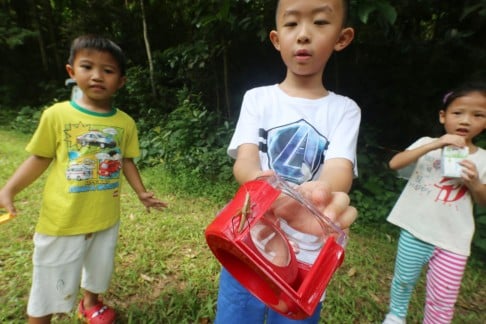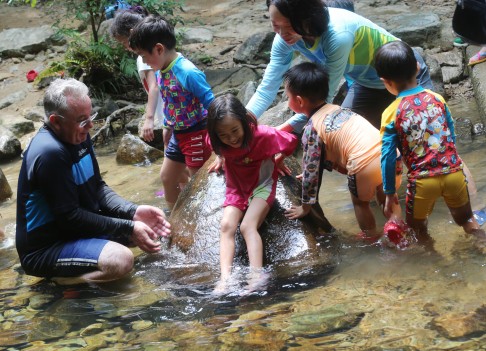
Hong Kong's new breed of kindergartens: no classroom, no uniform, just kids outside playing and having fun in the dirt
A new breed of kindergarten is introducing youngsters to the magic of outdoor play

On a recent Sunday in Tai Po Kau Nature Reserve, teacher Danie Strydom and a few preschoolers were using the slippery face of a river boulder as a slide. Just a few metres away, another group of children were carefully building, branch by branch, pebble by pebble, a riverbank shelter for "forest elves".
Welcome to Hong Kong Forest Kindergarten. It's among several nature-based nurseries that have emerged in the city, operating without classrooms or uniforms. While most kindergartens in Hong Kong adopt an academic approach, a few educators are advocating the power of outdoor play, exploration and nature during this critical period in a child's development.
Strydom had started his open-air classes in March as an eight-week experiment, inspired by the Swiss documentary School's Out: Lessons from a Forest Kindergarten. But two months turned into eight months, a handful of toddlers became hundreds, and the one-man band grew into a team of four. Now his playschool explores countryside destinations from Tai Tong Eco Park in Yuen Long to Lions Nature Education Centre in Sai Kung.
"The children take to it like fish to water when they enter the forest. I am astonished every day at how creative they are and how comfortable they are in nature. I call it the magic of play," says Strydom, a long-time volunteer for youth development projects worldwide.
He was always out and about when growing up in South Africa; he enjoyed camping overnight at his family farm in the Northern Cape and grilling fish he caught with self-made spears over a fire.
"I wanted to be like Huckleberry Finn and Tom Sawyer," says Strydom, who attributes his confidence and fortitude to those childhood adventures. "Whatever life throws at me, I know I will be OK because I have those experiences on the farm."
At Tai Po Kau, he engaged students from Steps Education in a treasure hunt.
"Sometimes high, sometimes low, where they are I don't know," Strydom chants goofily before disappearing into the vegetation, hastily tucking ladybug figures into bushes and camouflaging plastic rhinoceros beetles among fallen leaves.
This game isn't just for fun. It also teaches the children where different species live, although without much direct instruction.
Strydom is an advocate of unstructured play, which allows children to improvise and learn to interact with each other.
The children might return from their outing, clothes soiled and tired out from the running around, but they'll be more sure-footed and independent than they were in the morning, he says.
"It's great to see children beaming with self-confidence, having climbed rocks, swum in a river or held a worm for the first time … I see them self-evaluate if [the obstacle] is too high or too low? I see them go 'yes' when they take a big step and succeed without assistance."

While parents are asked to accompany toddlers to Strydom's courses, he advises them against hovering. The children are expected to carry their own backpacks, go on hour-long hikes (no strollers allowed) and resolve any disputes with other youngsters on their own.
"We can allow [children] to grow by stepping back," he says. "Often parents or teachers step in too quickly … instead of taking their hand, we would say 'I think you can do it' and let them discover for themselves whether they can achieve it. We are also realistic … children might get bruises. We encourage them to dust themselves off and [teach others] to help. So there's an element of empathy that they learn."
Catherine Sum took her five-year-old daughter Amery to Strydom's class in the hope that the outing would encourage her little girl to make new friends, appreciate nature and to be more adventurous.
"Many city children are repelled by insects and refuse to play in mud only because their parents label those things as icky and filthy," she says.
It took Sum's little girl a while to loosen up. Amery lingered in the shallows of the creek, watching Strydom and another boy blow bubbles in the water. When invited to join in the fun, she squawked and clung to her mother. Still, Amery eventually warmed up and joined in the fun.
For Alex Lau, who took his five-year-old son Lucas to the Forest Kindergarten outing, it was an engaging way to learn about the environment.
The children take to it like fish to water when they enter the forest
The few walks that he and his son went on were more about exercise than immersing in nature, so Lau appreciates having Strydom as a guide.
"It's good to have someone who knows his way round this place," Lau says. "[Strydom] knows where to find things that would pique little ones' interest and what places to avoid."
Over the past three years, the education non-profit Playright Children's Play Association, a firm supporter of free play, has also been working with kindergartens across the city to provide one-off forest school experiences at Yuen Long Park and Jordan Valley Park near Kowloon Bay.
The programme was partly in response to concerns over nature deficit disorder - a term coined by US journalist Richard Louv to highlight a lack of compassion and wonder among nature-deprived children, says Playright senior officer Wayne Chuah Zhi Xue.
Growing up in Malaysia, Chuah says he benefited from being able to join other children climbing trees and exploring drainage canals in their neighbourhood.
"It is these experiences that taught me the importance of teamwork, risk and courage," he says.
In Hong Kong, the main task of Chuah and his colleagues is to create a stimulating environment for children to explore, using readily available resources at the parks - fallen leaves, rainwater and the like. Then it's all up to the children.

At one of Playright's sessions, the group of barefooted children had plenty of ideas for the wicker baskets that staff had strewn around the lawn. Some youngsters repurposed them into turtles or pearl oyster shells, but others used them as Captain America's shield.
The children don't get any prompts about what to do. "We won't say: 'How about arranging the baskets into a straight line? Why don't we play turtle race,'" says Chuah. "We want to be their playmates, not teachers. And we let their imagination run wild."
Unlike at Strydom's outings, there are no parents in sight.
"When their parents are around, some children would feel pressured to seek the adults' permission while others would try to catch their attention or ask for help," Chuah says. "We want to see spontaneity. We want them to learn independence."
But what really sets nature schools apart from conventional ones is that the outdoor environment promotes adventure, Chuah says.
"At school, children are expected to follow rules, sit still and listen to teachers. They would be reprimanded for running or shouting. There aren't enough ways to channel their innate energy and creativity. At our forest school, we let children be children."